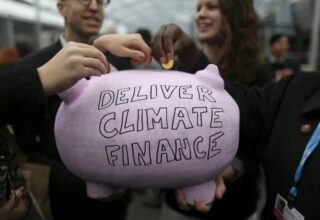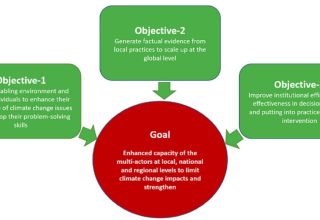(This article was originally published here)
Bangladesh ranks fifth among the world’s ten most vulnerable countries to climate change induced calamities in the world according to the Climate Risk Index, 2014. Bangladesh has become one of the most innovative fighters of climate change through both community-based adaptation, national level initiatives, as well as participation in international negotiations. At the national front, the Finance Division at Ministry of Finance, has instituted the Climate Fiscal Framework (CFF) a pioneering system leads the way in mainstreaming climate finance into the national fiscal system.
The concept of climate fiscal framework is still at an infant stage. It is a framework designed to ensure that external and internal finances are used most effectively in addressing climate change. By introducing such a framework, countries would be able to identify the demand (expenditure) and supply (revenue or finance) of how much funds are needed to finance climate projects. It establishes a transparent and sustainable system to track and verify climate finance use.
These elements are vitally important to Bangladesh as its annual climate finance flow is immense and the demand for climate change related investment is even larger. Without a robust fiscal system to bridge budget expenditure, and outcomes, it is extremely difficult to ensure that objectives in climate policies are delivered in a responsible and accountable manner. The Government of Bangladesh has acknowledged this as highlighted in the Bangladesh Climate Change Strategic Action Plan (BCCSAP 2009), where it states that there is a need to “study and map out fiscal issues for climate change.” Stemming from this document, the finance division developed a full proposal in 2014 for establishing a Climate Fiscal Framework, pending approval from the Planning Commission.
Nevertheless, Bangladesh will have to overcome at least three severe challenges before a sound climate fiscal framework can be established. Firstly, major efforts are needed to identify existing expenditures and modalities for financing in Bangladesh. This is rather complicated as Bangladesh is mobilising (internally) and receiving (externally) a large amount of climate finance and donor agencies have their own preference for disbursement modalities. Whoever receives their funds are required to comply. Secondly, on the demand side, the government needs to make estimations of future expenditures to create the budget drawing from action plans such as BCCSAP, but previous data is currently not available to make such estimations. Lastly, Bangladesh must create an enabling environment where private investors can entrust their capital with relevant institutions. Inevitably, this would require weakness detection and long term institutional capacity building.
There are many imperative building blocks for this ambitious fiscal framework. The most substantial one, arguably, is a set of climate change markers, or a climate budget code in the Ministry Budget Framework. With such a budget code, climate change expenditures can be effectively tracked using the existing national budgetary system, and thereby providing solid evidence for policy analysis and estimation of long-term finance needs. The great potential of climate code has already been verified in FY2012 to FY2014, during which all government expenditures were reviewed in the course of identifying climate related projects and programs. This experimental practice has given policy makers a clear insight on the portion of climate related expenditure that needs to be allocated in total public national budget.
Bangladesh has proved its leadership in smart actions to adapt to climate change to the world. It is now time to impress its followers with a benchmarking initiative on climate fiscal framework. The road towards it may not be easy, but with careful attention and planning all efforts will be rewarded and the government and donors will start to see returns on their investment in climate change programs.
Written by: Bowen Wang, a Climate Change Policy Research Consultant and Visiting Researcher at ICCCAD. This article is adapted from the presentation of Dr Krishna Gayen, Joint Secretary of Finance Division, at the Learning Hub Event on “Tracking and Monitoring Climate Finance” hosted by International Center for Climate Change and Development (ICCCAD) and International Institute for Environment and Development (IIED) on April 6, 2015.







